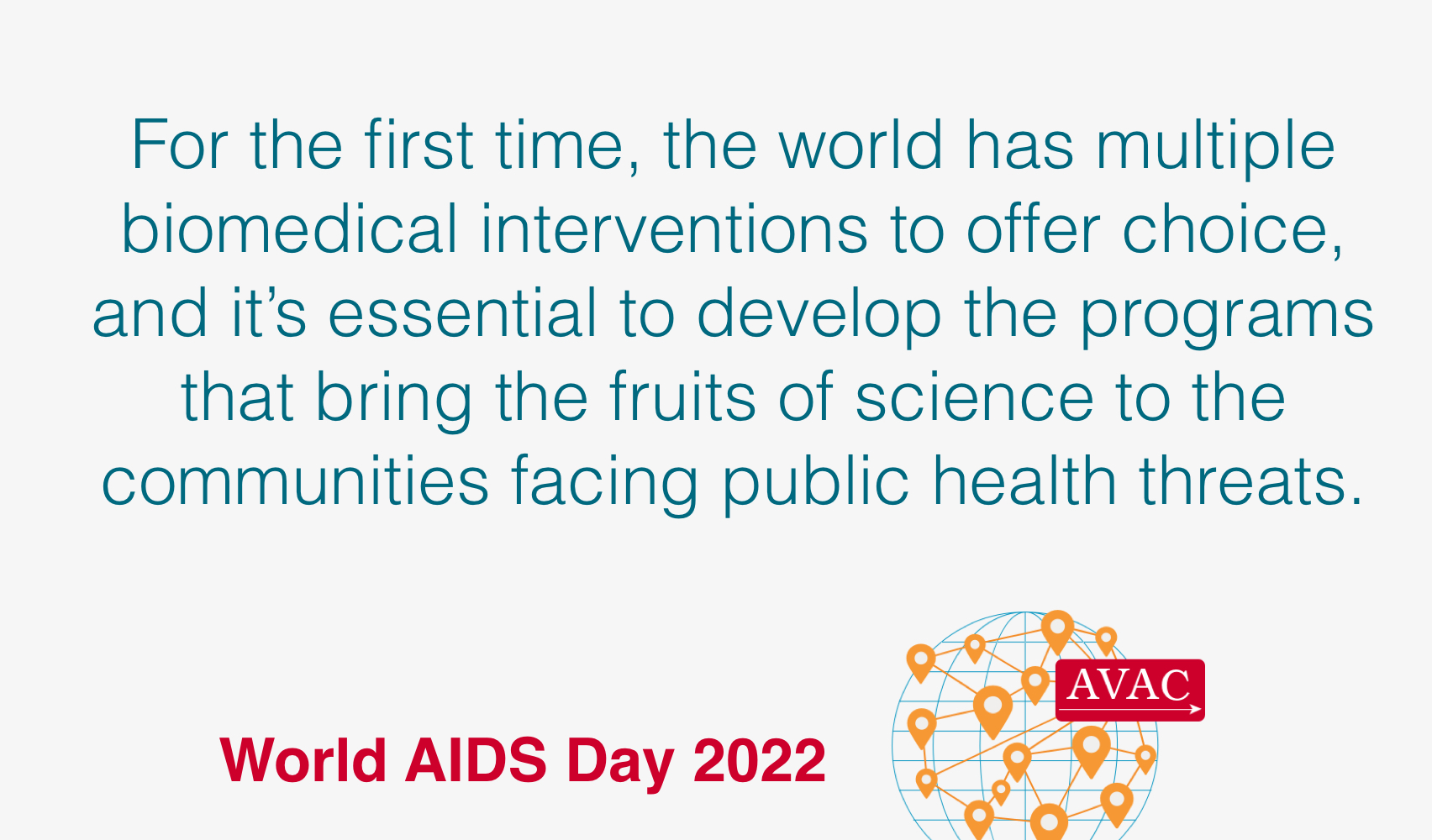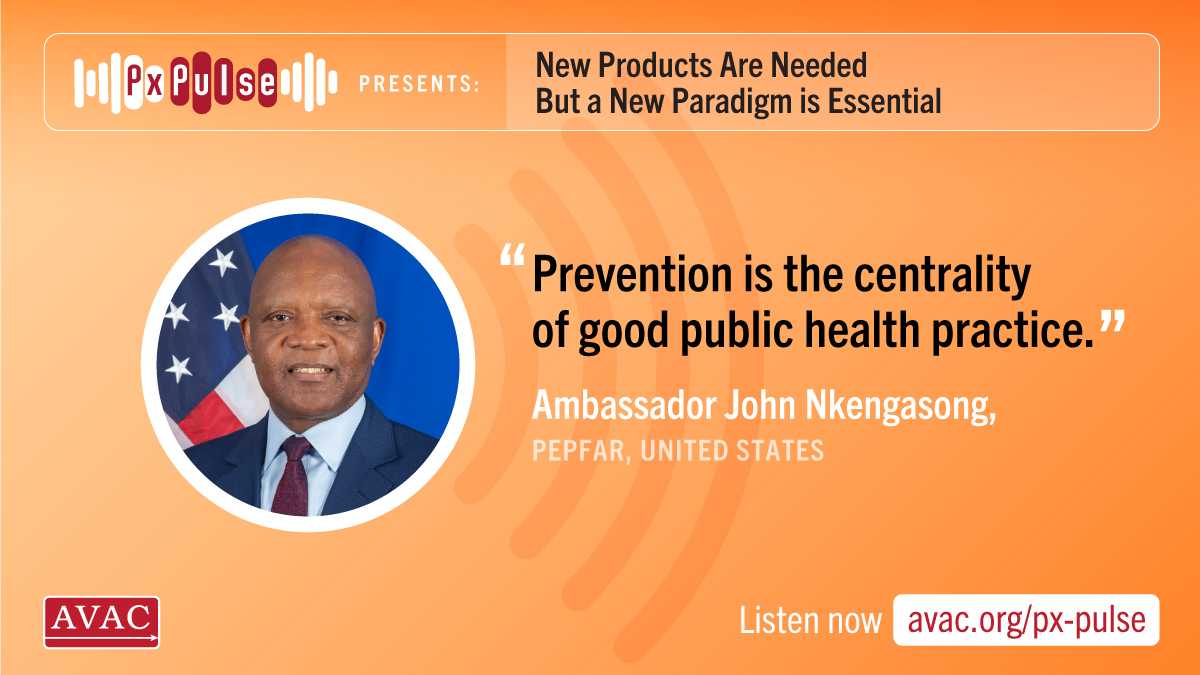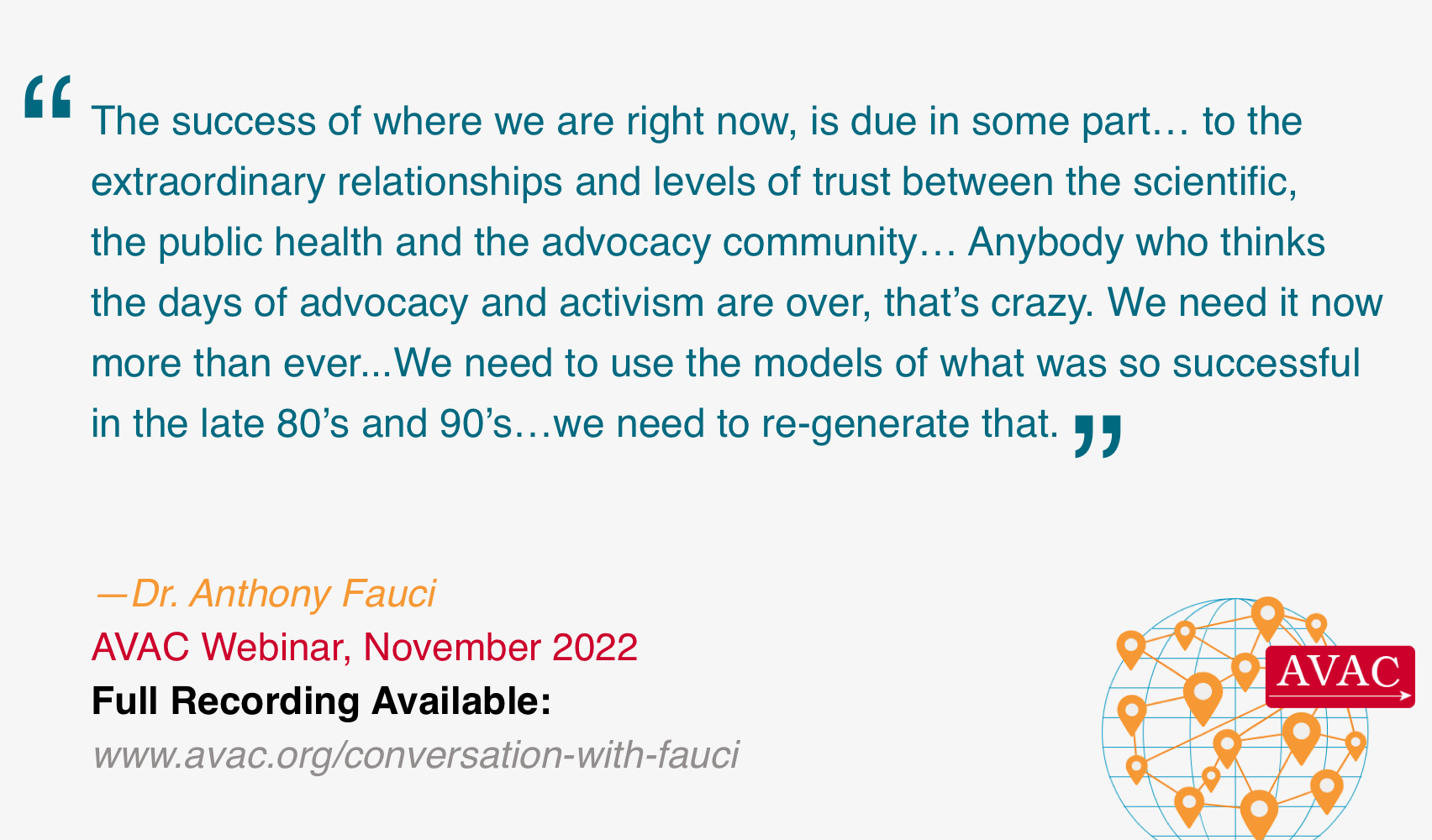Each World AIDS Day is an opportunity to reflect, remember and, hopefully, reenergize. This year is no different, but, more than 40 years into this epidemic – and in the midst of multiple other pandemics and persistent inequities – this could be the year that marks a fundamental reshaping and reimagination of HIV prevention, if everyone does their part.
This week alone, we heard global leaders – including PEPFAR Ambassador Dr. John Nkengasong on AVAC’s PxPulse podcast, Dr. Anthony Fauci, Director of NIAID on our webinar, WACI Health director and CASPR partner Rosemary Mburu at the African Union and APHA director and CASPR partner, Yvette Raphael, on IAS’s HIV Unmuted podcast – all remark on this once-in-a-lifetime opportunity to accelerate access to new prevention options and prepare for future ones.

Let’s start with long overdue conversations about a new approach to delivering proven products (see AVAC’s plan for accelerating access to injectable cabotegravir for PrEP), and doubling down on investing in HIV prevention. At AVAC, we’ve long called for tailored, community-led prevention programs that integrate sexual and reproductive health, and most importantly, offer choices at scale. This means a range of products offered across a spectrum of programs. It means investment that will deliver these products and programs at a scale that will reach everyone who needs prevention. Global leaders, confronting heartbreaking rates of HIV infection that have been stalled at about 1.5 million new diagnoses a year for several years, are calling for bold new initiatives.
In the latest episode of AVAC’s PxPulse podcast, New Products are Needed and a New Paradigm is Essential: A new era in prevention?, Ambassador Nkengasong issued a call to action for an for an aggressive strategy to scale up combination prevention, including injectable cabotegravir for PrEP (injectable CAB). As the Ambassador said, “Imagine if we did this in five high incidence countries, what will happen in two years? That is where we are going to begin to break the backbone of this vicious cycle. As I said, the most difficult thing is making that decision to act. The rest is tenacity.”
Listen to the full podcast for the details.
Also in this podcast, Executive Director of HEPS-Uganda, current COMPASS partner and former AVAC Advocacy Fellow and Kenneth Mwehonge, talks about the commitments needed from a range of stakeholders to bring Global HIV Prevention Coalition’s new roadmap to life, and hit 2030 targets for ending the epidemic. Chief among the priorities: leadership must come from donors to fully invest in coordinated planning, and expanded roles for civil society leadership in the design and execution of these plans. And Lilian Benjamin Mwakyosi, the Executive Director of DARE in Tanzania, another former AVAC Advocacy Fellow and current COMPASS partner, explains why choice, programs and products, and community leadership are essential to overcome the real-world barriers that have stalled and frustrated prevention efforts to date. As Lilian said, “Sustainability is guaranteed when communities are engaged. So that’s one thing…to strengthen immediately.”
Embracing these priorities now is a once-in-an-epidemic opportunity to end the public health threat of HIV, and prepare for future ones. This week, South Africa has become the fourth country in the world to approve injectable CAB for PrEP, the dapivirine vaginal ring (DVR) is approved in a growing number of countries, and oral PrEP use is on the rise, passing the mark of three million initiations earlier this year. For the first time, the world has multiple biomedical interventions to offer choice, and it’s essential to develop the programs that bring the fruits of science to the communities facing public health threats.
During AVAC’s conversation with Tony Fauci earlier this week, he said it clearly: “We’ve got to get user-friendly PrEP to [people]. That’s going to involve implementation that integrates itself into the health care delivery system. Otherwise, we’re going to have highly effective interventions that are not being maximally utilized, and that would really be a big mistake.”
AVAC has been spearheading efforts to advance these priorities across our programs. In Montreal, at AIDS 2022, The Coalition to Accelerate Access to Long-Acting PrEP launched, with AVAC as the secretariat. As part of COMPASS and CASPR coalitions, we are joining civil society partners to lead key initiatives for stakeholder engagement on programs and projects delivering injectable CAB and DVR. These initiatives must be part of truly comprehensive and integrated prevention programs that link biomedical options with structural and behavioral programs. We championed the creation of the African Women’s Prevention Accountability Community Board and the Key Population Advisory Group. These two groups, representing affected communities, are offering essential leadership to ongoing planning for the introduction of these new prevention options. This leadership is crucial to reaching the 2025 UNAIDS target of less than 370,000 new annual HIV infections. It’s a vital part of our work, which has pushed community leadership, global access to proven interventions and accelerated research and introduction from the very beginning. And now it’s crunch time, when all this work must come together and yield results.
Highly effective options now exist and new discoveries continue to improve on them; it’s up to all of us to marshall the will, the money and the innovative partnerships to put people at the center of programs so these biomedical options translate into actual choices and deliver impact.




